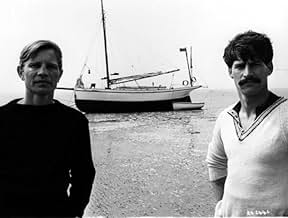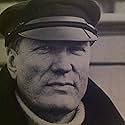IMDb RATING
6.4/10
1.5K
YOUR RATING
In 1901, two British yachtsmen visiting Germany's Frisian Islands accidentally discover a German plot to invade England.In 1901, two British yachtsmen visiting Germany's Frisian Islands accidentally discover a German plot to invade England.In 1901, two British yachtsmen visiting Germany's Frisian Islands accidentally discover a German plot to invade England.
- Director
- Writers
- Stars
- Director
- Writers
- All cast & crew
- Production, box office & more at IMDbPro
Featured reviews
Tony Maylam (and Christopher Challis - read his autobiography, "Are they really so awful") went all-out in this film to recreate a feel for Erskine Childers's slightly jingoistic novel, and for the joy of messing about in boats. The film achieves much of what it set out to do, but some extra elements grafted on to the original plot slightly spoil it for me.
The plot features Davies, an English amateur yachtsman (brilliantly played by Simon MacCorkindale) who stumbles onto something strange while pottering around the bleak Friesian coast in northern Germany. Mystified, he summons his old friend Carruthers (Michael Yorke) to help uncover the secret.
As a detective tale or spy story viewed through the eyes of either Davies or Carruthers, the film works. The few action sequences, which are almost always seen from the viewpoint of others, tend to fall flat and spoil the overall continuity. The subtitles to scenes in which characters are speaking in German are annoying, since almost everything is also translated verbally for the benefit of Davies who does not speak the language.
That said, this is quite a tense film, and gives a very true rendering of the novel.
The scenery and props are quite superb. Davies's yacht is a joy to look at from the outside and suitable poky in the interior shots. The flat coastal scenery is very atmospherically shot and the costumes are very good.
Except for a rather wooden "Kaiser Bill", the acting is excellent, though this is no less than one would expect from such as Alan Badel and Jenny Agutter.
This film is very enjoyable, but best watched with one's thinking cap on.
The plot features Davies, an English amateur yachtsman (brilliantly played by Simon MacCorkindale) who stumbles onto something strange while pottering around the bleak Friesian coast in northern Germany. Mystified, he summons his old friend Carruthers (Michael Yorke) to help uncover the secret.
As a detective tale or spy story viewed through the eyes of either Davies or Carruthers, the film works. The few action sequences, which are almost always seen from the viewpoint of others, tend to fall flat and spoil the overall continuity. The subtitles to scenes in which characters are speaking in German are annoying, since almost everything is also translated verbally for the benefit of Davies who does not speak the language.
That said, this is quite a tense film, and gives a very true rendering of the novel.
The scenery and props are quite superb. Davies's yacht is a joy to look at from the outside and suitable poky in the interior shots. The flat coastal scenery is very atmospherically shot and the costumes are very good.
Except for a rather wooden "Kaiser Bill", the acting is excellent, though this is no less than one would expect from such as Alan Badel and Jenny Agutter.
This film is very enjoyable, but best watched with one's thinking cap on.
If you've read the book you'll realise that it couldn't be made into a 90 minute or so film. Bits have to be cut and some scenes adapted so that the film contains a flowing understandable narrative. Often this is not particularly successful. Riddle of the Sands suffers to some extent in this way. Nevertheless this is a pretty good attempt at transferring the book to film. Michael Yorke and Simon McCorkindale are right for the parts they play. Neither are my favourite actors but I don't think many others would have portrayed the characters, warts and all, as realistically. The supporting cast are where the real strength of the film lies. Hans Meyer as Grimm is wonderfully sinister, as indeed is Michael Sheard as Boehme. Alan Badel was one of the best actors ever and his portrayal of Dollman is flawless. Jenny Agutter as Clara also shines. The music by Howard Blake deserves mention because the soundtrack is so important when setting the mood and, besides, the recurrent theme is a very nice piece of music. This is a slow-paced film but is nonetheless a powerful and well told story. If you want fast action and explosions everywhere give it a miss and head for some standard Hollywood identikit action film. If you want a well made story set in beautiful surroundings with good understated performances and a decent soundtrack try and hunt down a copy of the video or catch it on one of its rare TV showings.
Not popular on its small first release this wonderful and genuinely beautiful thriller is great adventure and well cast. Set in 1901 off the sandbanks near the Fresian Islands near Brussells/Germany /Holland RIDDLE is an atmospheric foggy 'chums in peril' mystery with a spunky cast and sublime and eerie sailboat thrills. The woolly jumpers alone should have won an award! York and MacCorkindale are almost interchangeable but the always gorgeous Jenny Agutter is as usual irreplaceable and perfect. MacCorkindale even leaps overboard one morning all nude, just to liven up the visuals! Filmed in panavision this really suffers on TV and deserves a DVD release to allow a whole new generation to soak up what is a generally unappreciated but lovely sailing thriller. The art direction and atmosphere is so accessible it is almost enough reason to just let yourself sail away. It is one of my favorite films and patient viewers will be well rewarded. It seems to be screened constantly on late night Australian TV, and even has an extra scene early in the film as Michael York arrives by train. RIDDLE OF THE SANDS is one of the most absorbing and beautiful Edwardian/Victorian era films made in Britain in the 70s.
The Riddle of the sands is an espionage thriller, but it is also a coming of age story. Carruthers begins as a prat and little by little under Davies' gentle tutelage, he becomes a great human being and a man. The film draws this beautifully, and the three leads are adorable together. For people who like boats, it's a feast, and major actors of the film are the boats... Dulcibella is a great fictional heroine and she (and the others) are beautifully rendered here.
The music is haunting. Yes it doesn't move fast, but that's what sailing's about. It's a pleasure in a fast-moving world to imagine a time when things happened at sailboat speed.
The DVD print is crisp and clear, and there are no format problems A joy to watch!
The music is haunting. Yes it doesn't move fast, but that's what sailing's about. It's a pleasure in a fast-moving world to imagine a time when things happened at sailboat speed.
The DVD print is crisp and clear, and there are no format problems A joy to watch!
It's probably impossible to transfer the cozy atmosphere of Erskine Childers's book to the screen, but Maylam's attempt is a creditable one. The Dutch and German villages, the sand banks, the coastline, all in muted browns and greys, look every bit as dull as you'd expect them to, but we begin to see their attraction; and something of the feeling of day-to-day life on a boat is conveyed to us. A nice score by Howard Blake helps give us the measure of things.
It's what we COULD have expected to survive transition to the screen - excitement - that's most really lacking. Childers's novel was (so everyone says) the first modern spy story. In addition to a love of the sea it also conveys a sense of menace, a feeling that something of importance hangs on the riddle of the sands, which the film, blandly paced and having to resort now and then to first-person narration, doesn't. It's still pleasing enough, especially if you've read the book and the film isn't giving away any of its secrets.
It's what we COULD have expected to survive transition to the screen - excitement - that's most really lacking. Childers's novel was (so everyone says) the first modern spy story. In addition to a love of the sea it also conveys a sense of menace, a feeling that something of importance hangs on the riddle of the sands, which the film, blandly paced and having to resort now and then to first-person narration, doesn't. It's still pleasing enough, especially if you've read the book and the film isn't giving away any of its secrets.
Did you know
- TriviaThe "Dulcibella" sailing yacht seen in the movie weighed seven tons and spanned 30 feet. The boat was discovered in Cornwall and converted for the film's sailing sequences. The yacht was actually built in the same shipyard as the vessel "Vixen" which was a boat owned by original source author Erskine Childers whose experiences aboard her inspired the film's "Riddle of the Sands" source novel.
- GoofsWithers the valet tells Carruthers that he has "a letter from abroad marked urgent" there is no indication anywhere on the envelope that it is urgent. Both sides of the envelope are shown clearly and in close up.
- Quotes
Davies: Do you realize that England has not defenses at all facing Germany? No North Sea fleet? And all her naval bases are in the south: Portsmouth, Chatham.
Carruthers: Historical accident.
Davies: Oh quite! But now it's not France whom we have to guard against. Germany is growing stronger every single day, and very soon, her navy will rival ours.
- Crazy creditsOpening credits prologue: Frisian Islands, Germany 1901
- ConnectionsFeatured in Wonderland: Episode #1.4 (2022)
- How long is The Riddle of the Sands?Powered by Alexa
Details
- Release date
- Country of origin
- Languages
- Also known as
- Bei Nacht und Nebel
- Filming locations
- Bushey Studios, Bushey, Hertfordshire, England, UK(studio: The Riddle of the Sans was filmed in)
- Production companies
- See more company credits at IMDbPro
Box office
- Budget
- £1,000,000 (estimated)
Contribute to this page
Suggest an edit or add missing content






























